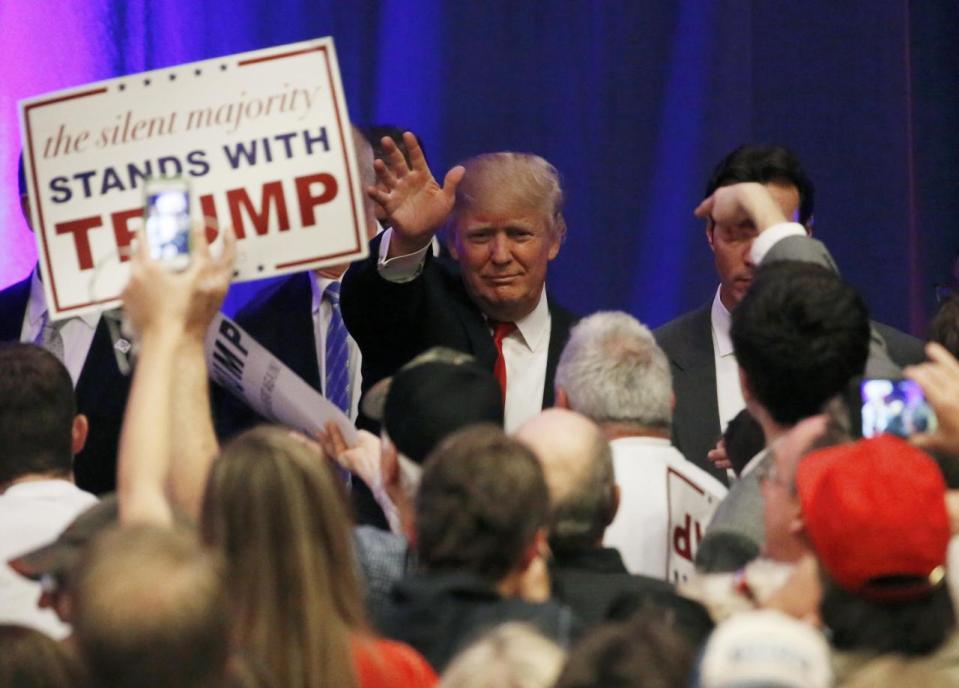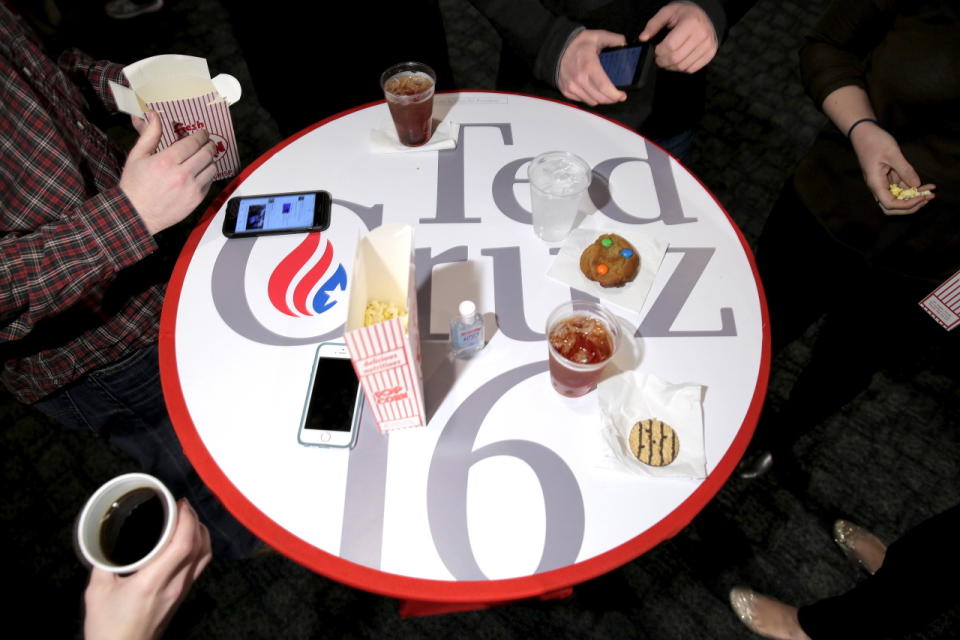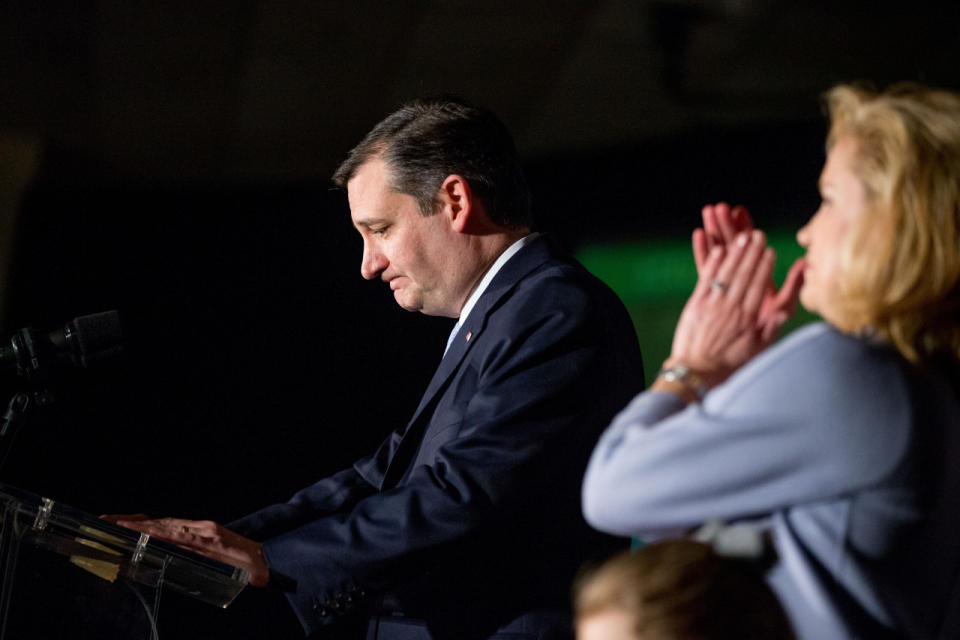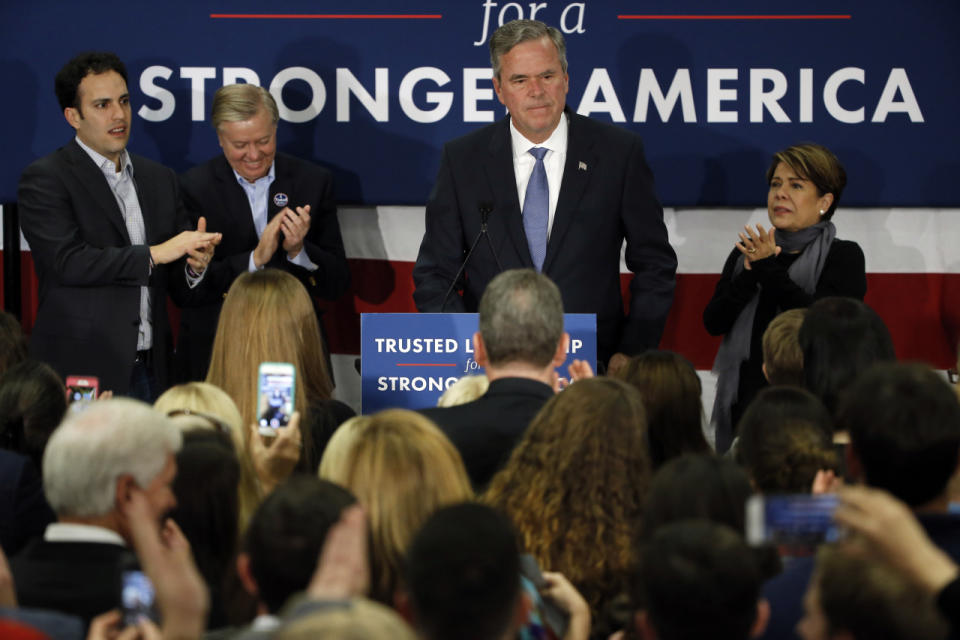Two senators now stand between Trump and the GOP nomination
COLUMBIA, S.C. — With his second decisive primary victory, Donald Trump is now the clear frontrunner for the Republican Party’s presidential nomination.
The most pressing question now, after Trump’s win in the South Carolina primary, is how long it will take for Marco Rubio or Ted Cruz to knock the other out and take Trump on directly.
The longer that Cruz and Rubio divide up the non-Trump vote, the more time the New York real estate developer will have to rack up delegates and win 50 percent of the primary electorate in popular vote totals.
A field that at its peak numbered 17 candidates has, to all intents and purposes, been winnowed down to three. Former Florida Gov. Jeb Bush dropped out of the race a few minutes before 9 p.m. Saturday, after finishing in single digits in the Palmetto State. Ohio Gov. John Kasich looks determined to stay in the race for some time, but is regarded by many political observers as a sideshow who is merely angling to gather delegates and use them for his own purposes at the convention. Meanwhile, retired neurosurgeon Ben Carson has proved an afterthought at the polls, although he has enough money to stay in for some time and insists that he has plans to.
The results Saturday night were another splash of cold water in the face of a Republican Party that had closed its eyes and desperately hoped for Trump’s polling lead to evaporate, as it did in Iowa. Instead, the outlandish provocateur garnered his second commanding win in a row.
“South Carolina, we will never forget you,” Trump said in his victory speech in Spartanburg, S.C., Saturday night.

Republican presidential candidate Donald Trump greets supporters after speaking at his South Carolina primary night victory rally on Saturday in Spartanburg, S.C. (Photo: Jonathan Ernst/Reuters)
Slideshow: Winners and losers in S.C. and Nevada >>>
Now the GOP establishment looks fearfully forward to a new phase of the primary contest. It moves to Nevada in just three days, and then to a slate of a dozen states on March 1, 10 days from now. Of those March 1 states, seven are in the South or Midwest, and are likely to tilt strongly toward Trump.
Trump, with 33 percent in South Carolina, cleared the 30 percent bar that many had pegged as a barometer for showing whether or not he had lost momentum over the last few days. Rubio and Cruz were locked in a dead heat for second place, at 22 percent each, before Rubio was projected as the second-place winner by less than two-tenths of one percentage point after midnight.
Trump won a majority of votes from veterans in this state, which has a strong military presence, despite the fact that he had explicitly blamed former President George W. Bush for the 9/11 attacks in a debate one week ago. Trump argued in that debate that the Bush administration “lied” about whether there were weapons of mass destruction in Iraq.
Live blog: Recap Saturday’s coverage as it happened
The South Carolina primary has been won by the eventual Republican nominee in every presidential primary since 1980, with the exception of the last one, in 2012, when former House Speaker Newt Gingrich of Georgia was the victor. And Trump’s method of winning the Palmetto State this week defied logic or historical comparison. “Trump won this week despite coming out for [a] health care mandate, defending planned parenthood, blaming Bush for 9/11, standing by impeachment,” wrote NBC’s Chuck Todd on Twitter.
The big question for Trump is whether he can rise above 35 percent, his total support in New Hampshire, in any state. If he cannot, and Cruz and Rubio both stay in, interminably, then the Republicans could be headed for a contested convention. If he cannot, and either Cruz or Rubio knocks the other out, then whoever takes him on will be poised to defeat him, despite his early wins.
At least that’s the theory of many Republican political consultants who have been watching the race.

Supporters of Republican presidential candidate Ted Cruz have soda and cookies at a primary night rally on Saturday in Columbia, S.C. (Photo: Joshua Roberts/Reuters)
Trump disagrees that Cruz or Rubio voters won’t turn to him if one of the candidates leaves the field. “As people drop out, I’m going to get a lot of votes also,” Trump said in his victory speech.
Cruz has engaged in a withering back-and-forth with Trump over the past few weeks, while Rubio has largely avoided any engagement with the frontrunner. But Rubio may no longer have a choice whether to take on Trump directly. Trump signaled Saturday that he may soon put the Florida senator in his sights, tweeting that Rubio is “very weak on illegal immigration.”
In exit polls, Trump won big with voters who said they prefer a candidate who “tells it like it is.” Cruz won support from voters who look for a candidate who “shares my values.” Rubio won among voters who look for someone who “can win in November.”
At the Trump rally, aides backstage devoured public exit polls with glee, noting Trump’s wins in demographic categories where his strength had been underestimated, including evangelicals and hard-core conservatives in upstate South Carolina. The aides said they believe it signals momentum for Trump heading into the March 1 states, where they once viewed Cruz as their biggest threat but now see him as increasingly neutralized.
“If Cruz can’t win South Carolina, where can he win?” a Trump aide, who declined to be named, told Yahoo News.
But even as Trump aides were making a victory lap, there were subtle shifts in strategy in South Carolina that will continue into future contests. In the final days of the primary, Trump added events at smaller venues, and he began making more unannounced stops — including swings through small-town diners. On Friday, the candidate campaigned from early morning until nearly 10 p.m. at night — not unusual for most candidates, but unusual for Trump, who typically flies home to New York every night.
For Cruz, the results were a disappointment. He had owned second place in polls in the state until very recently, and hoped after winning Iowa to do well in New Hampshire — where he came in third — and then to prevail again in the heavily evangelical South Carolina. But Trump won evangelical voters here 32 percent to 27 percent for Cruz.

Republican presidential candidate Sen. Ted Cruz, R-Texas, with his wife, Heidi, addresses supporters at his primary night rally at the South Carolina State Fairgrounds in Columbia, S.C., on Saturday. (Photo: Andrew Harnik/AP)
Cruz has outstanding organizations in many states that are set to vote on March 1 and beyond, and is extremely well-funded. But he must fight to keep the Republican electorate from concluding that the race should be narrowed to Rubio vs. Trump. Cruz will be helped by the fact that many conservative Christian voters in the March 1 primary states across the South will remain attracted to him. But he will have to fend off Rubio’s courtship of the slice of that voting bloc who will never vote for Trump.
Cruz, speaking last of all the candidates on Saturday night, argued that he is the only conservative remaining in the race, and that he is also the best hope for Republicans to defeat Trump.
“Only one strong conservative is in a position to win this race,” Cruz said. “We are the only campaign that has beaten and can beat Donald Trump.”
Looking ahead to March 1, Cruz’s campaign manager, Jeff Roe, said his operation has “been built for this day for the entire time.” Roe said the so-called SEC primary is “an electoral map that favors us.”
“And then, after that, we’re going to go and battle out in the winner-take-all states and decide who the nominee is. So, every piece of what we’ve been talking about has come together,” Roe said.
Rubio’s campaign breathed a sigh of relief, given the candidate’s situation just a week ago, when the Florida senator appeared to be on the ropes after his disastrous debate performance on Feb. 6 in New Hampshire. The argument undergirding the candidacies of governors Bush, Kasich and New Jersey’s Chris Christie — that a governor with executive experience was better prepared to be president than a senator — received a fresh hearing that week.
But a steady debate performance this past Saturday, an endorsement from South Carolina Gov. Nikki Haley and strong campaigning helped Rubio recover and survive. He had once hoped for a win in this state, just as Cruz had, and would have been well-positioned here had he not stumbled in New Hampshire. Now he must gird himself for a long and brutal primary if he wants to win.
In an impressive election-night speech inside an industrial warehouse — just a few hundred yards from the Cruz event — Rubio acknowledged that he had arrived in South Carolina 10 days ago “in search of a new beginning and a fresh start.”
“Many thought it was over,” Rubio said. “South Carolina will always be the place of new beginnings and fresh starts.”

Former Florida Gov. Jeb Bush, with his wife, Columba, son Jeb Bush Jr., far left, and Sen. Lindsey Graham, R-S.C., makes his farewell speech Saturday night at his primary rally in Columbia, S.C. (Photo: Matt Rourke/AP)
For Bush, the results Saturday night were a heavy blow, following a few days in which his candidacy went from hopeful to knocked-out. After over-performing in New Hampshire, Bush got a two-point bump right away. But his performance there came at an enormous cost, with data showing that his campaign and his super-PAC spent a total of $36 million in New Hampshire, as compared to just $3.7 million for Trump and only $580,000 for Cruz.
Then came the debate bloodbath on Feb. 13, a debate in which Cruz and Rubio ripped into one another and Bush tried to take on Trump, with some success. Trump looked intemperate and out of control and was booed repeatedly.
“I believe Jeb Bush has emerged as the alternative to Donald Trump,” Sen. Lindsey Graham, R-S.C., said on CBS News after the debate.
On Sunday and into Monday, there was the possibility that Jeb might be mounting a comeback, especially when it was announced that his older brother, George W. Bush, would come Monday to campaign for him.
The former president ridiculed and criticized Trump, but did not name him. George W. Bush described his brother as “a man of deep and humble faith that reveals itself through good works, not loud words.”
“Strength is not empty rhetoric, it is not bluster, it is not theatrics,” Bush said. “Real strength comes from integrity and character.”
But none of it made any difference.
Trump held an hourlong press conference Monday afternoon to draw attention away from the former president’s campaign stop, and assiduously avoided any direct and open confrontation with George W. Bush. With Trump avoiding escalation and focusing his rhetoric on Cruz, there was no real reason for W. to respond without risking more political capital than he was willing to. Bush advisers said the former president might very well have campaigned again if Trump had gone after him. Instead, Trump hid, and George W. Bush did not appear again.
Then, on Wednesday, press reports leaked in the morning that Haley would endorse Rubio. It was a gut punch for Bush, who, just the day before, had called winning her support “the most meaningful endorsement” in the state.

GOP presidential candidate Sen. Marco Rubio celebrates with South Carolina Gov. Nikki Haley and greets supporters on Saturday at his primary night rally in Columbia, S.C. (Photo: Win McNamee/Getty Images)
Haley endorsed Rubio on Wednesday night and campaigned with him all day Thursday and Friday, along with African-American U.S. Sen. Tim Scott and 51-year old Rep. Trey Gowdy, offering the GOP a picture of what their national profile might look like if Rubio won the nomination and picked Haley as his running mate.
In his concession speech, Bush choked back tears as he spoke and thanked his family. “I’m proud of the campaign that we’ve run to unify our country,” he said, “but the people of Iowa and New Hampshire and South Carolina have spoken, and I really respect their decision.”
“I congratulate my competitors who are remaining on the island,” Bush said with a slight chuckle.
South Carolina had been kind to the Bush family in the past. George H.W. Bush, Jeb’s father, won it in 1988 after losing Iowa to Sen. Bob Dole. George W. Bush won it in 2000 after losing to Sen. John McCain in New Hampshire.
But in 2016, a third Bush’s presidential campaign came to an end in the Palmetto State.

